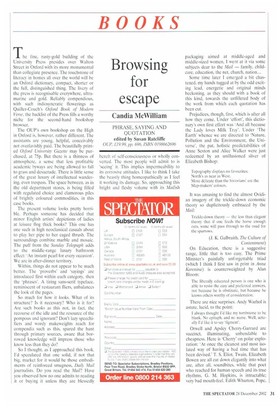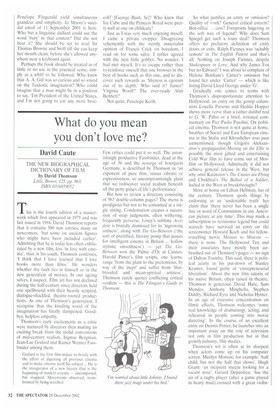Browsing for escape
Candia McWilliam
PHRASE, SAYING AND QUOTATION edited by Susan Ratcliffe OUP,179.99, pp. 696. ISBN 0198662696 The fine, rusty-gold building of the University Press presides over Walton Street in Oxford with its more monumental than collegiate presence. The touchstone of literacy in homes all over the world will be an Oxford dictionary, compact, shorter or the full, distinguished thing. The livery of the press is recognisable everywhere, ultramarine and gold. Reliably compendious, with such indiosyncratic flowerings as Quiller-Couch's Oxford Book of Modern Verse, the backlist of the Press fills a worthy niche for the second-hand bookshop browser.
The OUP's own bookshop on the 1-Ugh in Oxford is, however, rather different. The assistants are young, helpful, conceivably not overlavishly paid. The beautifully printed Oxford University Gazette may be purchased, at 75p. But there is a thinness of atmosphere, a sense that less profitable academic byways are being allowed to fall to grass and desuetude. There is little sense of the great luxury of intellectual wandering, even trespass. The space between, as in the old department stores, is being filled with regulated choice and clamorous piles of brightly coloured commodities, in this case books.
The present volume looks pretty horrible. Perhaps someone has decided that minor English artists' depictions of ladies at leisure flog thick books? This one has one such in high neoclassical casuals about to play her pipe to her caged thrush. The surroundings combine marble and mosaic. The puff from the Sunday Telegraph adds to the middle-range luxury bathroom effect: 'An instant pearl for every occasion'. We arc in after-dinner territory.
Within, things do not appear to be much better. The 'proverbs' and 'sayings' are introduced first within each category, then the 'phrases'. A tiring sans-serif typeface, reminiscent of restaurant fliers, unbalances the look of the pages.
So much for how it looks. What of its structure? Is it necessary? Who is it for? Are such books as this not, in fact, the recourse of the idle and the resource of the pompous and ignorant? Don't lazy speechifiers and wordy makeweights reach for compendia such as this, spared the hunt through primary sources, aware that borrowed knowledge will impress those who know less than they do?
So I thought, as I approached this book. I'd speculated that one solid, if not that big, market for it would be those embodiments of reinforced smugness, Daily Mail journalists. Do you read the Mail? Have you observed how no one admits to reading it or buying it unless they are blessedly bereft of self-consciousness or wholly converted. The most people will admit to is 'seeing' it. This implies impermeability to its corrosive attitudes. I like to think I take the beastly thing homeopathically as I feel it working its damage. So, approaching this bright and fleshy volume with its Mailish packaging aimed at middle-aged and middle-sized women, I went at it via some subjects dear to the Mail — family, childcare, education, the net, church, nation...
Some time later I emerged a bit chastened, my hands tugged at by the odd exciting lead, energetic and original minds beckoning, as they should with a book of this kind, towards the unfilleted body of the work from which each quotation has been cut.
Prejudices, though, first, which is after all how they come. Under 'effort', this dictionary's own first effort was 'And all because the Lady loves Milk Tray'. Under 'The Earth' whence we are directed to 'Nature, Pollution and the Environment, the Universe', the pat, holistic predictabilities of Anne Sexton and Alice Walker were just redeemed by an unillusioned sliver of Elizabeth Bishop:
Topography displays no favourites; North's as near as West.
More delicate than the historians' are the Map-makers' colours.
It was amusing to find the almost Ovidian imagery of the trickle-down economic theory so duplicitously embraced by the Mail:
Trickle-down theory — the less than elegant theory that if one feeds the horse enough oats, some will pass through to the road for the sparrows.
(J. K. Galbraith, The Culture of Contentment) On Education, there is a suggestive range, little that is too easy. The Prime Minister's painfully unforgettable triad (which I think I first saw in print in Anna Karenina) is counterweighted by Alan Bloom:
The liberally educated person is one who is able to resist the easy and preferred answers. not because he is obstinate, but because he knows others worthy of consideration.
There are nice surprises. Andy Warhol is astute, lucid, to the point: I always thought I'd like my tombstone to be blank. No epitaph, and no name. Well, actually I'd like it to say 'figment'.
Orwell and Apsley Cherry-Garrard are succinct, illuminating, unbendable to cheapness. Here is 'Cherry' on polar exploration: 'At once the cleanest and most isolated way of having a bad time that has been devised.' T. S. Eliot, Twain, Elizabeth Bowen are all cut down elegantly into what are, after all, soundbites, while that poet who reached for human speech and its true rhythms, G. M. Hopkins, is intractable; very bad mouth-feel. Edith Wharton, Pope, Penelope Fitzgerald yield simultaneous grandeur and simplicity. Jo Moore's suicidal email of 11 September 2001 is here. Who but a linguistic dullard could use the word 'bury' in that context? Did she not hear it? She should be set to read Sir Thomas Browne and Swift till she can keep her mouth clean, before she's allowed anywhere near a keyboard again.
Perhaps the book should be treated as of little or no use in the practical sense, simply as a whiff to be followed. Who knew that A. A. Gill was so curious and so sound on the Teutonic imagination? Who could imagine that a man might be in a position to say, 'I'm President of the United States, and I'm not going to eat any more broc coli!' [George Bush, Sr]? Who knew that Ice Cube and the Princess Royal were pretty well at one on childcare?
Just as I was very much enjoying myself, I came a private cropper. Disagreeing vehemently with the sternly materialist opinion of Francis Crick on boredom, I read on for some salve. I rather agreed with the next little gobbet. No wonder. I had met myself. It's to escape rather than to reinforce oneself that one browses in the best of books such as this one, and to discover such rewards as 'Shyness is egotism Out of its depth.' Who said it? James? Virginia Woolf? The ever-ready Alan Bennett?
Not quite. Penelope Keith.



























































 Previous page
Previous page